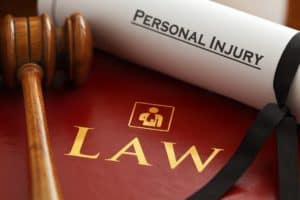We welcome you with a Servant’s Heart and a Warrior’s Spirit. Bienvenidos, Se Habla Espanol.

Words from the Founder:
When people outside the government can watch everything we do online or on our phones, privacy invasions occur daily. People can invade your privacy while using a computer in their underwear on the couch.
Invasions of Privacy have never been more of an issue than now.
Many firms can bring your Invasion of Privacy claims, but how many of them know precisely what you are going through because they have been victims and can use that emotion while pursuing victory for you? I do, and I have, and this experience will be the fuel that drives this firm while we fight for justice for you.
I have had my identity stolen, which hurt my credit, making life harder for a while.
Many folks worked hard to get where they are and deserve what they got. Then comes along a person who does not want to put in the work but instead invades your privacy to steal from you and pretend to be you. It is repulsive.
This firm believes in the sanctity of your castle and your private life.
While in law school, I took a class that few others did that covered Invasions of Privacy extensively.
I understand the complexities of these claims, and this firm has the knowledge to bring you justice.
I will ensure these claims are taken seriously because the invasion of one’s privacy becomes the invasion of all our privacies if left unopposed.
We Stand Ready To Serve.
-JW Zepeda

In an era where privacy is a thing of yesterday, many still value our privacy. Some things in life and moments only belong to you, and no one else has the right to share them without your consent.
The law values your privacy as well, and there is Common-Law (judge-made law) that protects your privacy in a variety of different ways.
This firm will pursue justice for you and take these cases personally because an invasion of one person’s privacy today turns into an allowable invasion on all of us tomorrow if left unchecked.

Pursuing a Personal Injury Claim does many things:
For Example:
Invasions of Privacy happen in multiple ways:
Misappropriation
This type of claim protects the plaintiff (the person suing) from having their name or likeness used by the defendant (the person being sued), usually for some advantage or benefit to the defendant.
This claim does not protect the name but the economic value of the name.
Right to Publicity
It is like Misappropriation. However, this property right protects the name and likeness of a deceased person.
This claim would fall under a Survival claim. These claims allow certain family members of the death to bring civil claims that the deceased could have brought themselves.
Intrusion into Seclusion
It occurs when a defendant intentionally intrudes upon the solitude, seclusion, or private affairs or concerns of another.
The intrusion must be highly offensive to a reasonable person to recover from it. And the intrusion needs to cause injury to the person whose privacy was violated.
Public Disclosure of Private Facts
This type of claim occurs when private facts are made public; making those facts public would be highly offensive to a reasonable person. The facts made public are not a valid public concern.
For Example, A court has held that even married couples are entitled to privacy from one another. Spouse “A” making a recording, or someone, spouse “A,” hires to make a recording of spouse “B” when “B,” thinks they are in complete privacy could be a claim that allows recovery of damages.
These claims do not only have to be brought against the wrongdoer. The claim can hold their employer liable as well.
Respondeat superior: This is a way to hold an employer or company responsible for the actions of another (“vicariously liable”). Suppose the company’s representative acted within the scope of their duties when the injury
occurred. In that case, the employer is liable too.
This rule takes an excellent legal argument because the other side will try to argue that their representative was on a “frolic.”
A frolic is a departure from the scope of their duties, and therefore the employer would not be liable.
The employer is usually the only party with the finances and sufficient insurance to bring justice to injured individuals. It is of the utmost importance not to lose this legal argument if there is a path to victory.
Damages would include any financial loss or damage to your reputation that results from the claim.
“Damages” in this context mean what you may be able to get from bringing this type of lawsuit.
General Damages (Economic Damages): These are Damages that an attorney does not need to specially plead because they are usually suffered by the type of injury sustained. A characteristic of these Damages is that they are easier to quantify because they are not subjective.
Loss of Income earning ability (known as lost wages):
The injured person would have made money through employment if not injured.
As the name suggests, these damages also apply to the loss of income-earning ability.
Suppose the injured party took a lesser-paying job due to their injuries.
The amount recoverable is the difference between wages before the injury and now.
These wages are measured from the time of the injury to the time of settlement or jury decision.
Future wages:
If the injured person could never do the same job they had before the injury, the decrease in pay will be permanent. The injured party may be entitled to the wages they would have earned in the future at the job they had before the injury.
Furthermore, this recovery is for any quantifiable decrease in the injured person’s financial situation due to employment changes.
For Example:
Commissions and bonuses.
Any change in benefits.
Promotion or raises missed due to the injury.
Medical costs:
These costs will be for past and future medical expenses.
Based on the injury, the injured will need future medical attention. Because the costs are the fault of the liable (this is the civil court equivalent of saying “guilty” in a criminal case) party, that party will be held responsible for these costs.
Special Damages (Non-Economic Damages):
These types of injuries are hard to prove. An attorney must specially plead them because they must be more apparent to third parties.
Mental anguish (Emotional distress) (this is the mental effects that came about due to the injury):
The injured party may recover due to past and future mental anguish caused by the injury.
Though this type of injury may be the most devastating, these injuries may not always be recoverable.
The ability to recover from these injuries is very situation specific. It requires a personal injury attorney who knows the law and case law developments. A competent attorney can fight against insurance companies because insurance companies rarely want to give anything significant for mental anguish.
Pain and suffering:
These types of Damages allow recovery for the injured person for the pain and suffering that the injury caused.
Because this injury is personal, it is often hard for others to understand and believe the pain and suffering the injured person went through or is going through.
Proving the pain and suffering is a sell; either the other side will buy in and believe the injured party, or they will not.
Physical impairment (Loss of enjoyment of life):
This type of Damage may be recoverable if you had an activity you used to do and now can no longer do due to your physical limitations.
Loss of consortium:
Spousal:
If the injury was so severe as to affect your relationship with your spouse, YOUR SPOUSE MIGHT BE ABLE TO RECOVER under this type of Damage. This type of recovery would be from a separate claim filed by your spouse.
Children:
A CHILD COULD SUE SEPARATELY AND CLAIM THIS TYPE OF DAMAGE if their parent’s injury affected the parent’s role in the child’s life.
Disfigurement:
This type of recovery may be allowed when the injury has physically changed your body.
This type of Damage can be for past and future disfigurement.
Any other non-financial harm reasonably associated with the injuries may be recoverable.
Exemplary Damages (Punitive Damages):
To get exemplary Damages, the person looking for these Damages must prove by clear and convincing evidence that the injury is the result of either:
(1) Fraud.
Fraud: Occurs when a person misrepresents something essential to the bargain while knowing the misrepresentation is false, and the person being lied to is justified in their belief of the lie. And the lie caused Damages.
(2) Malice.
Malice: Is a specific intent to inflict substantial harm.
(3) Gross negligence.
Gross negligence: This is an act or omission, which a reasonable person in the wrongdoer’s shoes should have known of the extreme risk due to the probability of significant harm, and the wrongdoer knew of the risk and consciously disregarded the risk.
Unless these Damages are looked for under a statute that authorizes them, then clear and convincing evidence must show the matters and mental state of the statute conditions.
The jury must receive instructions on these Damages and be unanimous in their desire to award such Damages.
Clear and convincing: Proof would impart a “firm belief or conviction” if the evidence was presented to a reasonable person.

There are many defenses to personal injury and other tort cases, but not all will pertain to all injuries.
For Example:
Consent: The person suing allowed the harm to occur or the actions that led to the injury. The victim can give consent expressly (orally or written) or implied (by actions). Consent has other considerations that can waive the defense based on the circumstances or capacity of the victim.
Self-defense: If you reasonably believed that you were in danger and reasonably defended yourself, you may have a valid defense against civil liability. The defense will hinge on whether your belief in the defense and the force used were reasonable. Reasonableness will be decided using an objective standard.
Defense of others: If you reasonably believed that someone else was in danger and reasonably defended them, you may have a valid defense against civil liability. The defense will hinge on whether your belief in the defense and the force used were reasonable. Reasonableness will be decided using an objective standard.
Defense of your property: If you reasonably believed that your property was in danger and you reasonably defended it, you may have a valid defense against civil liability. The defense will hinge on whether your belief in the defense and the force used were reasonable. Reasonableness will be decided using an objective standard.
Defense of another’s property: If you reasonably believed another’s property was in danger and reasonably defended it, you may have a valid defense against civil liability. The defense will hinge on whether your belief in the defense and the force used were reasonable. Reasonableness will be decided using an objective standard.
Shopkeeper privilege: Business owners have a right to detain you to investigate a theft.
Comparative Negligence: Texas is a modified comparative negligent state. In Texas, you can sue for Damages only if you are not more than 50% to blame for your injuries.
Assumption of the risk: Plaintiff (the person suing) was aware of the risk and voluntarily assumed it. This defense would follow the rules of consent. This defense is no longer valid in Texas.
Absolute privilege: Certain positions allow people to act in a way that would otherwise be an actionable tort (a civil action due to harm) and not be held liable for injury caused.
Truth: Truth is a defense concerning defamation torts; the claim is not actionable if the statement is the truth.
Qualified privilege: This is like an absolute privilege but is limited in scope. In other words, it is only a protection for certain torts done for a set of particular circumstances.
How to deal with insurance companies:
People get insurance to cover harm caused to others and themselves, and we all usually have insurance.
Most of us have the impression that insurance companies are in business to help when unexpected expenses arise or tragedies happen, but that is not the purpose of insurance companies.
The purpose of insurance companies is to make money, like any other business.
So, the less money the insurance pays out, the more money they make. That is only common sense.
No matter how nice the person representing the insurance company is, or if you have already dealt with the insurance company and think they are the exception and care for their clients. The insurance company’s primary goal is to find a way not to pay your claim, with few exceptions.
Some insurance companies rely on scare tactics and threats to make you think you must settle or force you to pay out of pocket.
Follow these rules when dealing with insurance companies:
Calling an attorney is always possible, even if you have already talked to an insurance company.
Attorneys are legally obligated to put your interest above all else in matters involving you.
Insurance representatives who are contacting you are professional negotiators.
The above information is just part of the puzzle. A competent attorney must consider all this and more in personal injury cases.
It is said sunshine is the best disinfectant, which the law does. It shines the light on dangerous items, situations, and people.
Legal disputes are the primary way companies and individuals learn from their mistakes.
Legal disputes make the world safer for the next person while at the same time getting you the justice you deserve.
I assure you that this firm will take this type of claim personally because we treasure your justice, and we could save the next person from harm or death.
Your Justice Awaits. This Firm Will Be Your Champion And Fight For Your Family’s Honor.
We Will Get It Done.

A San Antonio, Texas, Born and Based Law Firm
Online Services Available All Day – Everyday | Except Christmas |
1005 E. Henrietta Ave., Kingsville, Texas 78363 | Administrative Hub | Mailing Address | Walk-Ins Welcome
401 E. Sonterra Blvd., Ste. 375, San Antonio, Texas 78258 | Walk-ins By Appointment Only
Some Services Are Offered World-Wide
All Services Are Available Throughout The State Of Texas
844 7-JWZLAW = 1-844-759-9529– Primary Number
Local Texas Phone Numbers
210-802-75JW= 210-802-7559
325-274-75JW= 325-274-7559
361-600-15JW= 361-600-1559
830-255-75JW= 830-255-7559
737-295-25JW= 737-295-2559
956-594-81JW= 956-594-8159
IMPORTANT NOTICE: THE CONTENT OF THIS WEBSITE IS NOT LEGAL ADVICE. THE CONTENT ON THIS WEBSITE IS FOR INFORMATIONAL PURPOSES ONLY. Using this website does not mean an attorney-client relationship exists between you and this law firm. The law is not a one size fits all approach, and your case must be thoroughly discussed with a competent attorney. We stand ready to serve and welcome you to contact our office to discuss your needs.
© 2022 JW Zepeda Law Firm | A Professional Limited Liability Company | All Rights Reserved.